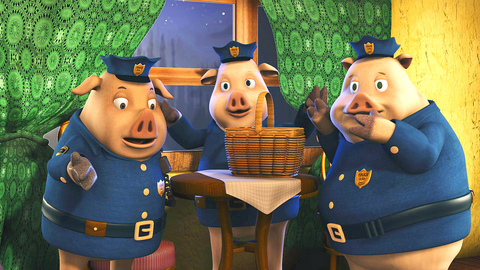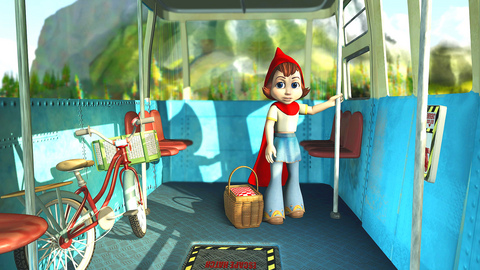Computers and cynicism have conspired to give us Hoodwinked, definitive proof that while classic fairy tales can't be counted on to charm and instruct 21st-century youngsters, the same holds true for their digitally animated deconstructions. Less sassy than shrill, more crass than clever, the maiden cartoon from the Weinstein Company turns the Little Red Riding Hood legend into a sub-Shrek bummer that appears to have been manufactured for the pleasure of tone-deaf kids with a thing for sarcasm, extreme sports, and Andy Dick.
Dick lends his voice to Boingo, a suspiciously perky rabbit caught up in the mystery of what really happened when Red (Anne Hathaway) paid a visit to Granny (Glenn Close) only to find a Wolf (Patrick Warburton) in drag and an ax-wielding Woodsman (Jim Belushi doing Arnold Schwarzenegger) crashing through the window.
Told in a jumble of flashbacks from multiple, improbable and equally unfunny points of view, the story is structured around a police investigation led by a frog detective named Nicky Flippers (David Ogden Stiers), with backup from Chief Grizzly (Xzibit), among other silly creatures. Thus do we learn that Granny leads a secret life as the hard-core snowboarder Triple G, that the Woodsman is a failed actor, and that Wolf is no criminal but an investigative journalist who would rather be a film critic.

PHOTOS COURTESY OF GROUP POWER
All of which may sound totally hilarious to dimwitted marketing executives and people who get a kick out of hearing Close say “fo shizzle.” But with visuals as stale as its writing, Hoodwinked won’t fool anyone else.


Behind a car repair business on a nondescript Thai street are the cherished pets of a rising TikTok animal influencer: two lions and a 200-kilogram lion-tiger hybrid called “Big George.” Lion ownership is legal in Thailand, and Tharnuwarht Plengkemratch is an enthusiastic advocate, posting updates on his feline companions to nearly three million followers. “They’re playful and affectionate, just like dogs or cats,” he said from inside their cage complex at his home in the northern city of Chiang Mai. Thailand’s captive lion population has exploded in recent years, with nearly 500 registered in zoos, breeding farms, petting cafes and homes. Experts warn the

The unexpected collapse of the recall campaigns is being viewed through many lenses, most of them skewed and self-absorbed. The international media unsurprisingly focuses on what they perceive as the message that Taiwanese voters were sending in the failure of the mass recall, especially to China, the US and to friendly Western nations. This made some sense prior to early last month. One of the main arguments used by recall campaigners for recalling Chinese Nationalist Party (KMT) lawmakers was that they were too pro-China, and by extension not to be trusted with defending the nation. Also by extension, that argument could be

Aug. 4 to Aug. 10 When Coca-Cola finally pushed its way into Taiwan’s market in 1968, it allegedly vowed to wipe out its major domestic rival Hey Song within five years. But Hey Song, which began as a manual operation in a family cow shed in 1925, had proven its resilience, surviving numerous setbacks — including the loss of autonomy and nearly all its assets due to the Japanese colonial government’s wartime economic policy. By the 1960s, Hey Song had risen to the top of Taiwan’s beverage industry. This success was driven not only by president Chang Wen-chi’s

Last week, on the heels of the recall election that turned out so badly for Taiwan, came the news that US President Donald Trump had blocked the transit of President William Lai (賴清德) through the US on his way to Latin America. A few days later the international media reported that in June a scheduled visit by Minister of National Defense Wellington Koo (顧立雄) for high level meetings was canceled by the US after China’s President Xi Jinping (習近平) asked Trump to curb US engagement with Taiwan during a June phone call. The cancellation of Lai’s transit was a gaudy